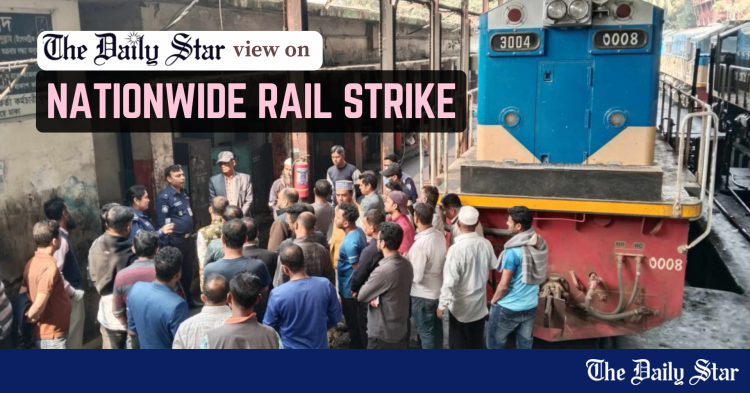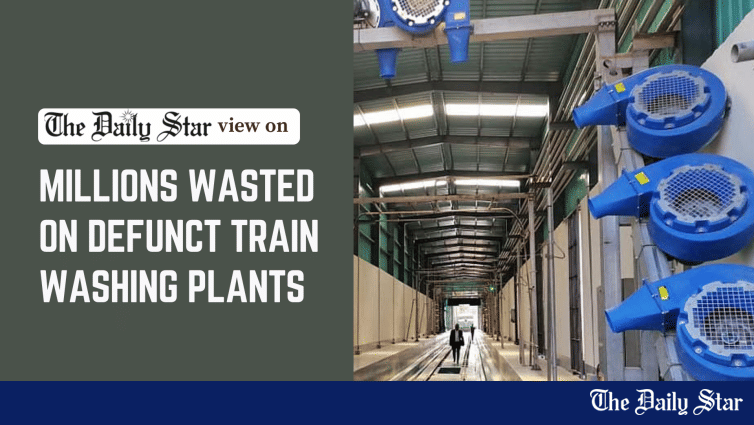Saif
Senior Member
- Joined
- Jan 24, 2024
- Messages
- 17,262
- Likes
- 8,334
- Nation

- Residence

- Axis Group


Train staffers call off strike
The strike was withdrawn after the union received assurances that their demands would be addressed
Train staffers call off strike

After more than 26 hours, railways staffers decided to withdraw their indefinite work abstention from early today.
The strike was withdrawn after the union received assurances that their demands would be addressed.
Mojibur Rahman, general secretary of Bangladesh Railway Running Staff and Sramik Karmachari Union, gave the announcement at around 2:45am today, after a meeting at the residence of the railway adviser on Mintu Road.
His announcement came following assurance of Railways Ministry Adviser Muhammad Fouzul Kabir Khan to meet their demands.
The meeting was attended by railway running staff leaders, government officials, student leaders, and a BNP leader.
Mojibur said the railway adviser promised to fulfil the staff's demands by tomorrow.
"We are sorry for the public suffering. I urge the running staff to return to their workplaces to operate the trains. The work strike is being called off from now," he said.
Bangladesh Railway Director General Afzal Hossain told The Daily Star that operations of all the trains will start from today as per the existing schedules.
Earlier, after the meeting, adviser to the railways ministry Muhammad Fouzul Kabir Khan assured the staff that their concerns would be addressed.
"I will talk to the finance adviser about the running staff facilities, and I am confident that I will be able to do this with responsibility," he said.
He also said that existing benefits for the staff would remain unchanged.
Earlier, a discussion was held at the residence , attended Railways Ministry Secretary Fahimul Islam, Shamsur Rshman Shimul Biswas, chief coordinator of Jatiyatabadi Sramik Dal, Hasnat Abdullah, convener of the Anti-Discrimination Student Movement, along with others.
After more than 26 hours, railways staffers decided to withdraw their indefinite work abstention from early today.
The strike was withdrawn after the union received assurances that their demands would be addressed.
Mojibur Rahman, general secretary of Bangladesh Railway Running Staff and Sramik Karmachari Union, gave the announcement at around 2:45am today, after a meeting at the residence of the railway adviser on Mintu Road.
His announcement came following assurance of Railways Ministry Adviser Muhammad Fouzul Kabir Khan to meet their demands.
The meeting was attended by railway running staff leaders, government officials, student leaders, and a BNP leader.
Mojibur said the railway adviser promised to fulfil the staff's demands by tomorrow.
"We are sorry for the public suffering. I urge the running staff to return to their workplaces to operate the trains. The work strike is being called off from now," he said.
Bangladesh Railway Director General Afzal Hossain told The Daily Star that operations of all the trains will start from today as per the existing schedules.
Earlier, after the meeting, adviser to the railways ministry Muhammad Fouzul Kabir Khan assured the staff that their concerns would be addressed.
"I will talk to the finance adviser about the running staff facilities, and I am confident that I will be able to do this with responsibility," he said.
He also said that existing benefits for the staff would remain unchanged.
Earlier, a discussion was held at the residence , attended Railways Ministry Secretary Fahimul Islam, Shamsur Rshman Shimul Biswas, chief coordinator of Jatiyatabadi Sramik Dal, Hasnat Abdullah, convener of the Anti-Discrimination Student Movement, along with others.






































